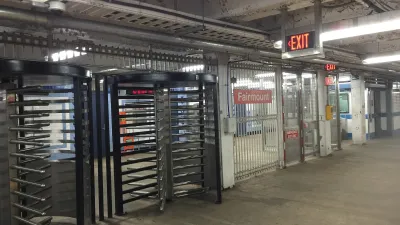What's a better way to ensure lower crime than to involve police directly in the planning process? One development in Washington, D.C. will do just that.
Following last week's post on Washington, D.C.'s new waterfront development, called the Wharf, The Washington Post's Peter Hermann reports on the inventive idea to prevent crime by directly involving the District's Metropolitan Police Department in the project's planning and design process.
"Police have long sought to promote public safety through design," says Hermann, "encouraging such common-sense features as bright streetlights, discouraging secluded footpaths and laying out roads to make it difficult to circle a block...In Los Angeles, police encourage gardeners to plant blackberry bushes because the spiny branches are hard for burglars to crawl through. Seattle police urge bank managers to trim hedges so that the front door is visible from the street. And in San Diego, police warn against street planters that, while visually appealing, might clog sidewalks if used as stools."
In Washington, D.C., the effort goes a step further, by involving law enforcement in the design process. "The process is informal, with the department reaching out to developers of major initiatives to request a seat at the table. When developers agree, [Police Chief Cathy] Lanier says, police can contribute while changes can still be made with the stroke of a pen instead of the rumble of a bulldozer."
FULL STORY: District police embrace concept of preventing crime through design

Maui's Vacation Rental Debate Turns Ugly
Verbal attacks, misinformation campaigns and fistfights plague a high-stakes debate to convert thousands of vacation rentals into long-term housing.

Planetizen Federal Action Tracker
A weekly monitor of how Trump’s orders and actions are impacting planners and planning in America.

In Urban Planning, AI Prompting Could be the New Design Thinking
Creativity has long been key to great urban design. What if we see AI as our new creative partner?

King County Supportive Housing Program Offers Hope for Unhoused Residents
The county is taking a ‘Housing First’ approach that prioritizes getting people into housing, then offering wraparound supportive services.

Researchers Use AI to Get Clearer Picture of US Housing
Analysts are using artificial intelligence to supercharge their research by allowing them to comb through data faster. Though these AI tools can be error prone, they save time and housing researchers are optimistic about the future.

Making Shared Micromobility More Inclusive
Cities and shared mobility system operators can do more to include people with disabilities in planning and operations, per a new report.
Urban Design for Planners 1: Software Tools
This six-course series explores essential urban design concepts using open source software and equips planners with the tools they need to participate fully in the urban design process.
Planning for Universal Design
Learn the tools for implementing Universal Design in planning regulations.
planning NEXT
Appalachian Highlands Housing Partners
Mpact (founded as Rail~Volution)
City of Camden Redevelopment Agency
City of Astoria
City of Portland
City of Laramie





























